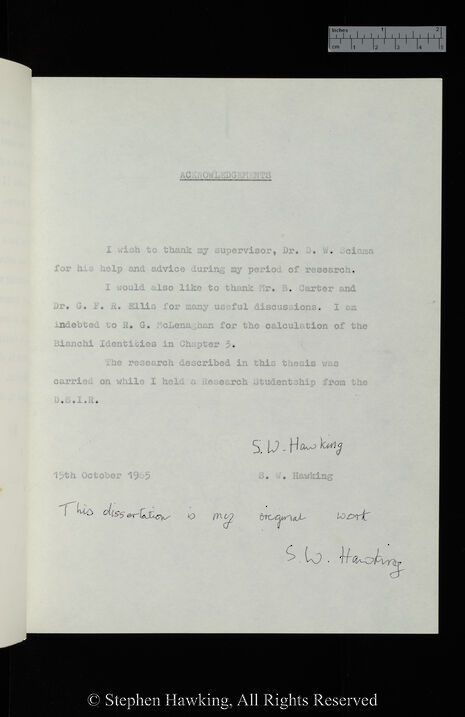The importance of being accessed
In the wake of Stephen Hawking publishing publicly his PhD thesis, Joseph Krol looks at the importance of access in science.

"We have been demoted to a medium-sized planet going round a medium-sized star somewhere near the edge of a fairly average galaxy. We are now so humble that we would not claim to occupy any special position."
So wrote Stephen Hawking in the introduction to his PhD thesis, over fifty years ago. The first major work of the world-famous Cantabrigian physicist, Properties of Expanding Universes, has this week been made publicly available by the University. It is a snapshot of the brilliant young scientist as he grappled with the most basic questions of human existence: Where do we come from? Where are we going? And is humankind in any sense 'special'?
The University's decision comes as a part of its annual Open Access Week, which also includes a series of lectures on increasing the "openness and reproducibility" of scientific research. Furthermore, this comes after a recent policy change which ensures that PhD students, from this month onwards, will be required to submit their theses online to aid future preservation. Indeed, the University Library has agreed to digitise the dissertations of any alumni who wish to make their work open access. Given the major copyright issues currently surrounding the release of academic research, these developments will no doubt be welcomed.

One imagines, however, that few theses today are as gloriously ambitious as Hawking's was. In scarcely more than a hundred loosely-typeset pages, Hawking pretty much demolished the then-mainstream Hoyle-Narlikar theory of gravity, which predicted a 'steady-state' universe that could exist indefinitely. He then went on to derive the expected properties of gravitational waves (which were, broadly speaking, recently confirmed in the results of the LIGO experiment), and he finished off by showing that under fairly general conditions, singularities in spacetime necessarily had to exist.
The upshot of this is that at the age of 24, he had proved that the universe almost certainly had a beginning, and that, in time, it would have to come to an end. It was as philosophically epochal as it was scientifically visionary. All this becomes yet more impressive considering he was already suffering from the debilitating ALS disorder that would eventually leave him wheelchair-bound (his handwritten candidate declaration on the thesis is little more than a scrawl). It is not just a work of profound scientific accomplishment, but a monument to the possibilities of human tenacity.
Hawking improved upon the conjectures of Hoyle, as indubitably future thinkers will improve upon the ideas of Hawking. Yet this is all contingent on these advances being open, on papers being free from paywalls. Indeed, modern scientific progress is built on transparency. It is essential that we can critique obsolescent theories, that we can try to reproduce experiments, that we can take inspiration from those that have gone before us, if we are to continue our intellectual development as a species.
The University's recent move to increase the availability of past research extends beyond this single work, as Hawking has acknowledged: "Anyone, anywhere in the world should have free, unhindered access to not just my research, but to the research of every great and enquiring mind across the spectrum of human understanding." In a world where political narratives seem to be increasingly questioning the importance of collaboration, these words ring especially true. As Hawking has said, in our scientific endeavours "each generation stands on the shoulders of those who have gone before them". These efforts to make data public are a key first step in letting scientific progress to reach its potential, allowing future generations to effectively deal with the technological issues of our rapidly evolving society.
Hawking is pessimistic about the future of man; he has expressed scepticism that humanity can survive even another century, as the threats of nuclear weapons, climate change and biowarfare loom ever larger. Yet there is still much to admire about the human race; our capacity for discovery and co-operation, as shown, if in some small way, by these new commitments to openness, is one of our noblest traits. If there is a way humankind can strive towards a special position in the universe, it is, no doubt, through science.
 News / University Council rescinds University Centre membership20 February 2026
News / University Council rescinds University Centre membership20 February 2026 News / Hundreds of Cambridge academics demand vote on fate of vet course20 February 2026
News / Hundreds of Cambridge academics demand vote on fate of vet course20 February 2026 News / Cambridge academics sign open letter criticising research funding changes22 February 2026
News / Cambridge academics sign open letter criticising research funding changes22 February 2026 News / Union cancels event with Sri Lankan politician after Tamil societies express ‘profound outrage’20 February 2026
News / Union cancels event with Sri Lankan politician after Tamil societies express ‘profound outrage’20 February 2026 News / Judge Business School advisor resigns over Epstein and Andrew links18 February 2026
News / Judge Business School advisor resigns over Epstein and Andrew links18 February 2026








